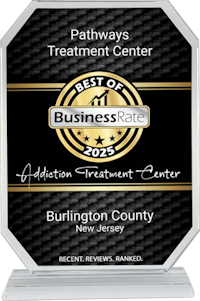Addiction recovery is a deeply personal journey, and no two paths to sobriety are the same. For many, the transition from rehab to everyday life can feel overwhelming. Sober living can be the perfect option to bridge treatment and return to your regular day-to-day life. These living arrangements offer a supportive, structured environment designed to help individuals maintain their sobriety while gradually reintegrating into daily life.
At Pathways Treatment Center in Burlington, New Jersey, we understand that recovery doesn’t end when rehab does. That’s why we offer sober living, outpatient treatment, and medication-assisted treatment to provide a continuum of care tailored to your unique needs.
What is Sober Living?
Sober living homes (also known as transitional living homes) are safe, substance-free environments designed to support individuals in early recovery. Unlike inpatient rehab, sober living offers more independence than treatment programs while still providing structure and accountability. Residents typically live with others also in recovery, sharing responsibilities and supporting one another as they navigate life after rehab.
At Pathways Treatment Center, our sober living program is designed to bridge the gap between rehab and full independence. We provide a supportive community, access to outpatient services, and a structured environment to help you build a strong foundation for long-term sobriety.
Who Might Benefit from Sober Living?
Sober living isn’t for everyone, but it can be an invaluable resource for many individuals in recovery. Here are some factors that might make sober living a good fit for you:
Rehab provides a highly structured environment, but transitioning back to the “real world” can feel jarring. Sober living offers a middle ground, a structured yet flexible environment where you can practice the skills you learned in rehab while still having ready support.
Our sober living homes are designed to help people in recovery establish healthy routines, from attending 12-step meetings and group therapy meetings to maintaining a stable work or school schedule. This structure can be especially helpful if you’re worried about falling back into old habits.
One of the biggest challenges in recovery is navigating relationships. Old friendships may have revolved around substance use, and building new, healthy connections can take time. Sober living provides a built-in community of peers who understand what you’re going through.
Living with others in recovery can help you form meaningful, sober friendships and reduce feelings of isolation. At Pathways, we encourage residents to support one another and participate in group activities, fostering a sense of camaraderie and accountability.
Jumping straight from rehab to full independence can be overwhelming. Sober living allows you to ease back into daily life at your own pace. You’ll have the freedom to work, go to school, or pursue other goals while still having access to support and resources.
Pathways Treatment Center’s sober living program emphasizes gradual independence. We help you set realistic goals and provide the tools you need to achieve them, whether that’s finding a job, managing finances, or rebuilding relationships with family members.
Relapse is a common fear for many in early recovery. Sober living can significantly reduce this risk by providing a stable, substance-free environment and ongoing support.
We offer a comprehensive approach to relapse prevention. Our sober living residents have access to outpatient treatment, individual and group therapy, and medication-assisted treatment (if needed). We also provide education on triggers and coping strategies to help you stay on track.
For many, returning home after rehab isn’t an option. Whether it’s due to an unsupportive living situation or a high-risk environment, sober living offers a safe alternative.
Our sober living homes at Pathways Treatment Center are designed to be a sanctuary for recovery. We provide a clean, comfortable, and substance-free space where individuals can focus on healing and personal growth.
How to Determine If Sober Living Is Right for You?

Deciding whether to move into a sober living home after completing addiction treatment is a big decision. Here are some questions to ask yourself:
- Do I feel confident in my ability to stay sober without 24/7 support?
- Is my home environment conducive to recovery?
- Do I have a strong support system outside of rehab?
- Am I worried about relapse or feel overwhelmed by the transition?
- Would I benefit from more structure and accountability immediately after rehab?
If you answered “yes” to any of these questions, sober living might be a good option for you. If you’re still unsure, consider asking for a second opinion from your therapist or a loved one. Additionally, you can discuss the option with an advisor during your rehab program as part of your aftercare plan.
What are the Benefits of Sober Living?
Sober living homes offer a structured and supportive environment for individuals transitioning from inpatient treatment or those needing extra support in early recovery. Here are some key benefits:
- Structured Environment: Sober living homes establish routines and rules that promote healthy habits and accountability. This structure helps individuals re-establish a sense of normalcy and stability in their lives.
- Peer Support: Residents live with others who share similar experiences, fostering a sense of community and understanding. This peer support network provides encouragement, shared experiences, and a sense of belonging.
- Accountability: Regular check-ins, house meetings, and drug testing promote accountability and help residents stay on track with their recovery goals. This accountability reduces the risk of relapse.
- Development of Life Skills: Sober living homes often provide opportunities to develop essential life skills, such as budgeting, cooking, and job searching. These skills are crucial for successful reintegration into independent living.
- Relapse Prevention: The structured environment, peer support, and accountability measures help residents develop coping mechanisms and relapse prevention strategies. This support is particularly valuable during the vulnerable early stages of recovery.
- Transitional Support: Sober living homes bridge the gap between inpatient treatment and independent living, providing a gradual transition. This transitional support helps individuals adjust to a sober lifestyle and build a foundation for long-term recovery.
- Safe and Supportive Community: Homes and living situations centered in sobriety provide a safe environment that is free of addictive substances. They can be a safe haven for those who have an unsafe home environment.
- Reinforcement of Recovery Principles: Sober living homes often reinforce the principles learned in treatment, such as 12-step programs or other recovery models. This reinforcement helps to solidify recovery principles and help build a strong foundation for long-term sobriety.
Is Sober Living Effective?
Sober living programs can be an effective component of recovery for many individuals, particularly when combined with other forms of treatment and support. Studies have shown that those who stay in sober living houses may retain their sobriety longer than those who do not. Transitioning into sober living after completing an addiction treatment program can help reduce the risk of relapse.
However, sober living programs are not a one-size-fits-all experience. There are several factors that can affect the quality of your stay in a sober living home, including:
- Individual Motivation: The success of a sober living program often depends on the individual person’s willingness to engage in the process and adhere to the rules.
- Length of Stay: Research suggests that longer stays in sober living (such as 6-12 months) are associated with better long-term outcomes.
- Aftercare Planning: Effective programs help residents create a plan for maintaining sobriety after leaving the sober living home, including ongoing therapy, support groups, and relapse prevention strategies.
Recover From Addiction at Pathways Treatment Center

At Pathways Treatment Center in Burlington, New Jersey, we’re committed to helping you achieve lasting recovery. Our sober living program is just one of the many ways we support individuals in treatment.
Whether you’re looking for a structured transitional environment, outpatient treatment, or medication-assisted treatment, we’re here to help. Our team of experienced professionals will work with you to create a personalized recovery plan that meets your needs and goals. We believe in treating the whole person, mind, body, and spirit. We work to empower you to build a fulfilling, sober life.
Sober living isn’t just a place to stay—it’s a stepping stone to a brighter, healthier future. If you’re ready to take the next step, Pathways Treatment Center is here to help.
Contact Pathways Treatment Center today to learn more about our sober living program and how we can support your recovery journey. Our team is here to answer your questions, provide guidance, and help you determine the best path forward.



